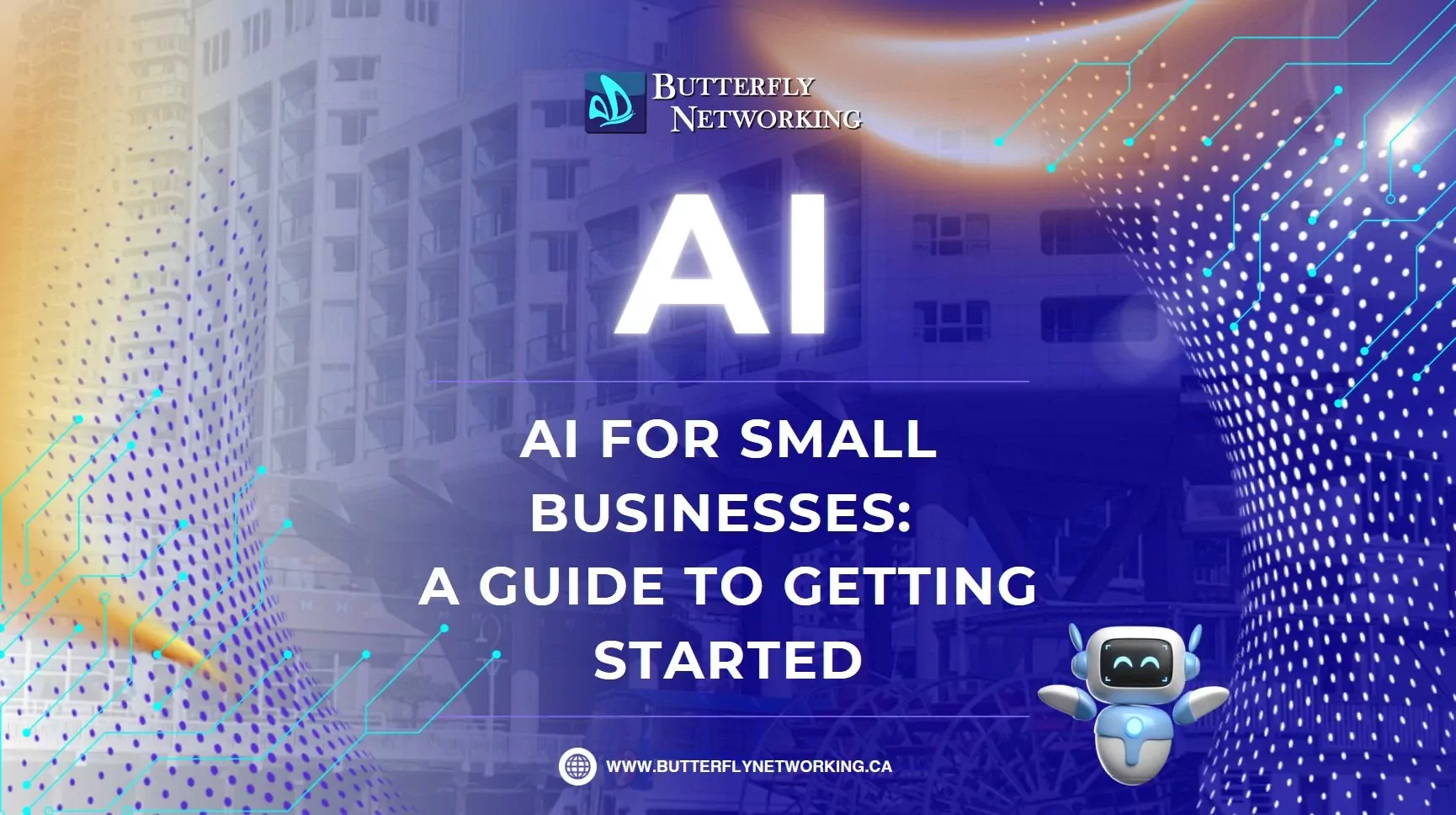AI for Small Businesses: A Guide to Getting Started
Transform small business operations with AI insights and tools, boosting efficiency and growth for entrepreneurs and startups.
In today's rapidly evolving business landscape, small businesses are increasingly turning to technology to remain competitive and efficient. One of the most transformative tools at their disposal is artificial intelligence (AI). AI for small businesses can streamline operations, personalize customer experiences, and ultimately drive growth. However, many entrepreneurs are unsure of how to get started with AI solutions. This guide aims to demystify the world of AI, providing practical steps for integrating artificial intelligence tools into your business strategy. Whether you are looking to automate repetitive tasks or leverage machine learning for startups, this article will equip you with the knowledge needed to harness the power of AI effectively.
1. Understanding AI and Its Benefits for Small Businesses
Artificial intelligence encompasses a wide range of technologies that allow machines to mimic human intelligence. For small businesses, the adoption of AI can lead to substantial improvements in efficiency and decision-making capabilities. By understanding the core benefits of AI, entrepreneurs can make informed decisions about its implementation. Key benefits include enhanced data analysis, improved customer service, and increased productivity.
For example, AI-driven analytics tools can process vast amounts of data quickly, providing insights that were previously unattainable. This allows small business owners to make data-driven decisions that can significantly impact profitability. Moreover, AI technologies can enhance customer service by implementing chatbots that handle inquiries 24/7, freeing up human resources for more complex tasks.
Overall, embracing AI can lead to a more agile business model, enabling small businesses to adapt to changing market conditions and customer preferences. By investing in AI solutions, entrepreneurs can future-proof their operations and stay ahead of competitors who may be slower to adapt.
2. Practical Steps to Integrate AI Solutions
Integrating AI solutions into your small business begins with identifying areas where AI can add value. Start by conducting an internal assessment to pinpoint tasks that are repetitive or data-intensive. For instance, if your business spends considerable time on customer outreach, consider implementing AI tools that automate email marketing campaigns.
Additionally, explore various artificial intelligence tools available in the market. Many platforms offer user-friendly interfaces that do not require extensive technical knowledge. For example, CRM systems often come equipped with AI capabilities for lead scoring and customer segmentation.
Once you have selected appropriate tools, training your team is crucial for successful integration. Organize workshops or training sessions to familiarize your staff with the new technology. Encourage them to explore the AI features fully to maximize the benefits. Remember, the transition to AI is a journey, and ongoing support will be essential to ensure smooth implementation.
3. Case Studies of Successful AI Implementation
Many small businesses have successfully harnessed AI to revolutionize their operations. For instance, a small e-commerce retailer used AI-driven analytics to understand customer purchasing patterns. By analyzing this data, the retailer was able to tailor marketing strategies and improve inventory management, leading to a 30% increase in sales.
Another compelling case is a local restaurant that implemented an AI-powered reservation system. This system not only facilitated online bookings but also provided personalized recommendations based on customer preferences. As a result, the restaurant saw an increase in repeat customers and positive reviews.
These case studies illustrate that AI is not just for large corporations; small businesses can also benefit significantly from its implementation. By learning from these examples, entrepreneurs can envision how AI could transform their operations and customer interactions.
4. Future Trends in AI for Small Businesses
The landscape of AI is constantly evolving, and small businesses should stay informed about upcoming trends to remain competitive. One significant trend is the increasing accessibility of machine learning for startups. With various platforms now offering machine learning models as a service, even small businesses can leverage complex algorithms without extensive investment in infrastructure.
Another trend is the rise of AI-driven customer experience tools, which provide personalized interactions at scale. These tools utilize data to create tailored experiences, enhancing customer satisfaction and loyalty. Small businesses that adopt these technologies early on can establish a strong competitive edge in their respective markets.
Lastly, the integration of AI with other emerging technologies, such as the Internet of Things (IoT), will further expand its potential for small businesses. For example, IoT devices can provide real-time data that AI systems can analyze to optimize operations. This convergence of technologies will open new avenues for innovation and efficiency.
Conclusion

In conclusion, the integration of AI for small businesses presents immense opportunities for growth and efficiency. As entrepreneurs explore artificial intelligence tools, they can streamline operations, enhance customer engagement, and stay competitive in a fast-paced market. By following the steps outlined in this guide and learning from successful case studies, small business owners can embark on their AI journey with confidence. Embrace the future of business technology trends and start implementing AI solutions today to transform your operations and boost efficiency.
For more information on how to leverage AI for your small business, contact us at Butterfly Networking, 778-835-4032, in New Westminster, BC., Let us help you navigate the world of AI and unlock your business potential!
Check out our newsletter, Hyperlocal AI Weekly, for lots of great tips and strategies you can implement right away
Frequently Asked Questions

What are some examples of AI for small businesses?
AI for small businesses includes a variety of applications ranging from customer service chatbots to advanced data analytics tools. For instance, small retailers may use AI to analyze purchasing trends, while service-based businesses can implement chatbots to handle customer inquiries. Additionally, AI-driven marketing platforms can automate social media postings and email campaigns, enhancing outreach efforts without requiring extensive manpower.
How can AI improve customer engagement?
AI improves customer engagement by providing personalized experiences based on user data. For example, AI algorithms analyze browsing and purchasing history to recommend products tailored to individual preferences. Moreover, AI tools can automate responses to common customer queries, ensuring that clients receive immediate feedback and assistance, which enhances overall satisfaction and loyalty.
Is AI suitable for all types of small businesses?
While AI can benefit a wide range of businesses, its suitability depends on the specific needs and operations of each company. Service-oriented businesses may find AI beneficial for enhancing customer support, while product-based companies might leverage AI for inventory management and sales forecasting. It is essential for business owners to assess their unique requirements and determine how AI can best serve them.
What is the cost of implementing AI solutions?
The cost of implementing AI solutions varies widely based on the complexity of the tools and the size of the business. Many entry-level AI tools, such as chatbots and basic analytics platforms, are affordable and subscription-based. However, more advanced solutions that require custom development may incur significant costs. It is advisable for small businesses to start small, gradually scaling their AI investments as they see returns on their initial implementations.
How can I start using AI in my small business?
To start using AI in your small business, begin by identifying repetitive tasks that could benefit from automation. Research various AI tools tailored to your industry and budget. Once you have chosen the right solutions, invest time in training your staff to ensure they can utilize the tools effectively. Monitoring the outcomes of your AI initiatives will also help refine your approach and maximize your investment in technology.





